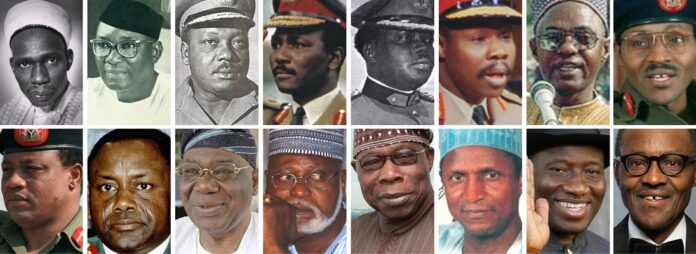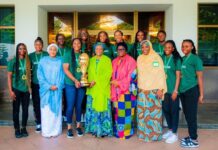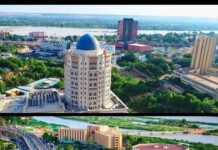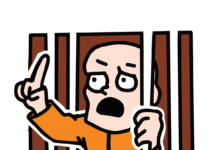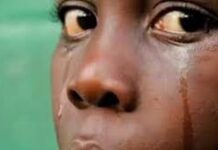In 60 years Nigeria has gone through the leadership of many great men. They rule in their different capacities as Heads of States and Civilian President.
Abubakar Tafawa Balewa 1960-1963
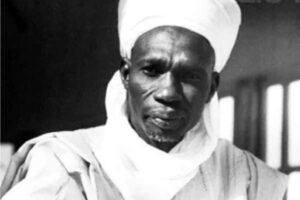
Born 1912, in Bauchi, Northern Nigeria and was assasinated in the first of two Nigerian army coups in January 1966, near Ifo, Nigeria.
The deputy leader of the Northern Peoples Congress (NPC), and the first Federal Prime Minister (1957–66).

However, as Prime Minister of Nigeria, he played important roles in the continent’s formative indigenous rule. He was an important leader in the formation of the Organisation of African Unity and creating a cooperative relationship with French speaking African countries. His image is on the 5 naira note.
Nigeria @60: Why leaders need to do more for children, youths
Nnamdi Azikiwe 1963-1966
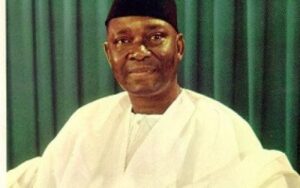
Born November 16, 1904, Zungeru, Nigeria, died May 11, 1996 in Enugu, first President of Independent Nigeria (1963–66) and prominent nationalist figure. Founder of the National Council of Nigeria and the Cameroons (NCNC).
His image is on the 500 naira note.
Johnson Aguiyi Ironsi 1966
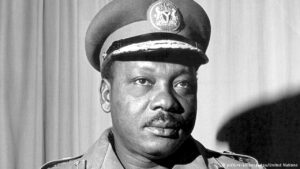
Born March 3,1924, and died in a military coup.
General Aguiyi-Ironsi was named Military Head of State. In July 1966, a group of Northern army officers revolted against the government, killed General Johnson Aguiyi-Ironsi, and appointed the army chief of staff, General Yakubu Gowon as the head of the new military government. He spent 194 days in office.
Yakubu Gowon 1966-1975
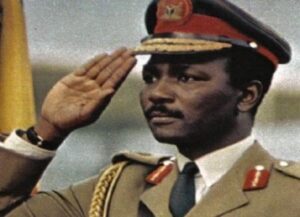
Born October 19, 1934, Pankshin, Nigeria, Nigerian military leader, who served as head of state (1966–75).
After the coup of January 1966, he was appointed Chief Of Staff by Major General Johnson Aguiyi-Ironsi, the new leader. Northern officers staged a countercoup in July 1966, and Gowon emerged as the compromise head of the new government.
Murtala Rufai Mohammed 1975-1976
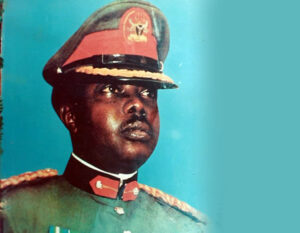
Born November 8, 1938 and died February 13, 1976, was the military ruler (Head of the Federal Military Government) of Nigeria from 1975 until his assassination in 1976.
In 1961, Muhammed was appointed aide-de-camp (ADC) to M. A. Majekodunmi, the federally-appointed administrator of the Western Region.
On July 30, 1975, Brigadier (later General) Muhammed was made head of state. On 3rd February 1976 the following seven Nigerian states were created by Murtala Muhammed: Bauchi, Benue, Borno, Imo, Niger, Ogun, and Ondo. This brought the total number of states in Nigeria to nineteen in 1976.
Olusegun Aremu Obasanjo 1976-1979
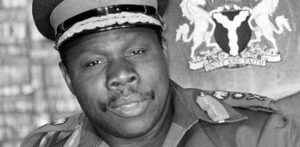
Born March 5, 1937, Abeokuta, Nigeria. Nigerian general, statesman, and diplomat, who was the first military ruler in Africa to hand over power to a civilian government. He served as Nigeria’s military ruler (1976–79) and, as a civilian, as president (1999–2007). Nigeria’s first civilian leader in 15 years, Obasanjo sought to alleviate poverty, reduce government corruption, and establish a democratic system.
Alhaji Shehu Shagari 1979-1983
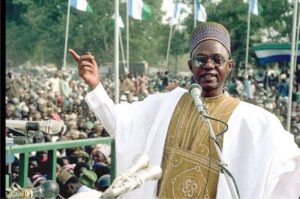
Born 1925, Shagari, died December 28, 2018. A Nigerian politician, president of Nigeria from 1979 to 1983.
Gen. Yakubu Gowon appointed him Federal Commissioner for Economic Development in 1971. December 31, 1983, a military coup led by Maj. Gen. Muhammad Buhari toppled the government, and Shagari was arrested. Shagari was cleared of personal corruption charges and released from detention in 1986 but was banned from participation in Nigerian politics for life.
Muhammadu Buhari 1983-1985
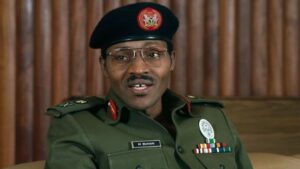
Born December 17, 1942, Daura, Nigeria, Nigerian military leader and politician who served as Nigeria’s Head of State in 1984–85 and was democratically elected president in 2015.
Many of the economic problems that had existed under the Shagari administration also plagued the Buhari regime, and Buhari instituted austerity measures. Although civilian government had returned to Nigeria in 1979 with the election of Shehu Shagari, dissatisfaction with dismal economic conditions and what the military perceived as corrupt politicians led to another military coup on December 31, 1983, and Buhari was chosen unanimously to be the new head of state.
Ibrahim Badamasi Babangida 1985-1993
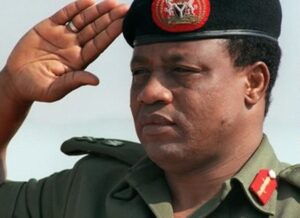
Born 17 August 1941 popularly known as IBB, is a Nigerian general and statesman who served as Military Head of State from 1985 until his resignation in 1993. He also served as the Chief of Army Staff from January 1984 to August 1985. Babangida rose through the ranks in the military and fought during the Nigerian Civil War, and played key roles in several military coups in Nigeria.
Ernest Adegunle Shonekan 1993
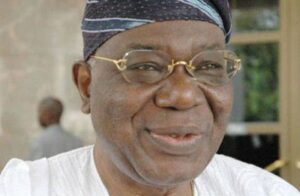
Born 9 May 1936 is a Nigerian statesman, lawyer and businessman who was appointed the Interim President of Nigeria by General Ibrahim Babangida on 26 August 1993 – 17 November 1993.
Sani Abacha 1993-1998
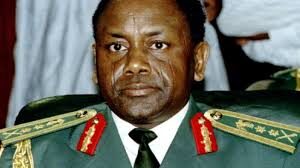
Born September 20, 1943, Kano, Nigeria and died June 8, 1998. Nigerian military leader, who served as Head of State (1993–98).
Babangida overthrew Buhari and installed himself as leader with Abacha as second in command. Elections were held in 1993 and were won by Moshood Abiola, a candidate supposedly supported by Babangida, who, however, annulled the elections and set up a Civilian Interim Government, which Abacha quickly overthrew.
Perhaps Abacha’s most brutal act was the imprisonment, trial, and subsequent execution for treason of writer Ken Saro-Wiwa and other Ogoni activists who were concerned with the environmental exploitation of their region by multinational petroleum companies.
Abdulsalami Abubakar 1998-1999
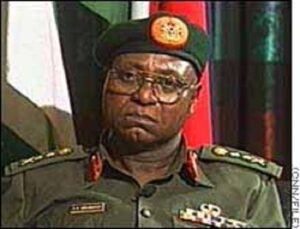
Born June 13, 1942, Minna, Nigeria, Nigerian military leader, who served as Head of State (1998–99).
Following the sudden death of Abacha in June 1998, Abubakar was sworn in as Nigeria’s Head of State. Like many other Nigerian military leaders, he promised a return to civilian government, but, unlike all except Olusegun Obasanjo, he kept his promise.
Olusegun Aremu Obasanjo 1999-2007
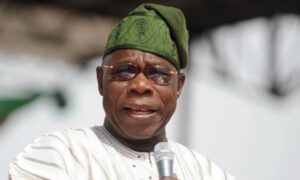
Born March 5, 1937, Abeokuta, Nigeria, Nigerian general, statesman, and diplomat, who was the first military ruler in Africa to hand over power to a civilian government. He served as Nigeria’s military ruler (1976–79) and, as a civilian, as president (1999–2007).
Obasanjo followed his predecessor’s timetable for a return to civilian rule and did not run for president when elections were held in 1979. A vocal critic of General Sani Abacha, who seized control of Nigeria in 1993 and established a repressive military government, Obasanjo was imprisoned in 1995 for allegedly organizing a coup against Abacha. Following Abacha’s death in 1998, Obasanjo was released. After the interim military leader, General Abdusalam Abubakar, pledged to hold democratic elections, Obasanjo announced his intention to run for president as the candidate of the People’s Democratic Party (PDP). He was declared the winner of the 1999 election with some 63 percent of the vote.
Nigeria’s first civilian leader in 15 years, Obasanjo sought to alleviate poverty, reduce government corruption, and establish a democratic system. He also pledged to reform the military and the police. Religious and ethnic strife, however, became a central concern during his presidency, as incidents of violence mounted and as most Muslim-dominated states in the north and centre of the country adopted Sharīʿah law.
In 2006 Obasanjo came under domestic and international criticism for attempting to amend the constitution to allow him to stand for a third term as president; the proposed amendment was rejected by the Senate later that year. With Obasanjo unable to run, Umaru Yar’Adua was selected to stand as the PDP’s candidate in the April 2007 presidential election. He was declared the winner, but international observers strongly condemned the election as being marred by voting irregularities and fraud. Nonetheless, Yar’Adua succeeded Obasanjo and was sworn in May 29, 2007.
Umaru Musa Yar’Adua 2007-2010
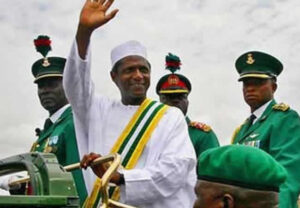
Born Aug. 16, 1951, Katsina, Nigeria and died May 5, 2010. Nigerian politician who served as president of Nigeria (2007–10). His inauguration marked the first time in the country’s history that an elected civilian head of state had transferred power to another. May 29, 2007, in the capital of Abuja, he was inaugurated as Nigeria’s 13th president. The ceremony had particular historical significance, as it was the first time in the country’s history that an elected civilian Head of State had handed over power to another.
Yar’Adua’s ability to serve while dealing with health issues was called into question after he went to Saudi Arabia in late November 2009 for treatment of heart problems and kidney problems.
On Feb. 9, 2010, the National Assembly voted to have Jonathan assume full power and serve as acting president until Yar’Adua was able to resume his duties. Yar’Adua never fully recovered, however, and died several weeks later. He was succeeded by Jonathan.
Goodluck Ebele Jonathan 2010-2015
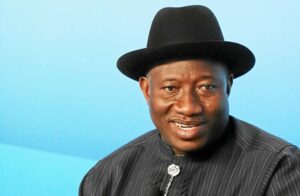
Born November 20, 1957, Otuoke, Nigeria. Nigerian zoologist and politician served as vice president (2007–10) and president (2010–15) of Nigeria.
Jonathan’s political career began when he became involved with the nascent People’s Democratic Party (PDP) in the late 1990s. He was elected deputy governor of Bayelsa state in 1999 under the party’s banner. He served in that position until 2005, when he was elevated to the governorship after the incumbent was charged with corruption and impeached. In 2007 he was selected to be the vice presidential running mate of the PDP’s presidential candidate, Umaru Musa Yar’Adua.
He handed over power to General Muhammadu Buhari, now President Muhammadu Buhari.
Muhammadu Buhari 2015 till date
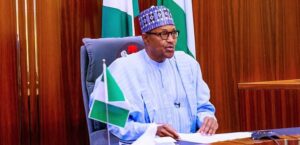
2014 the All Progressives Congress (APC) party nominated Buhari to stand as its candidate in the 2015 presidential election.
The March 28 presidential election had 14 candidates, although the real contest was seen as being between Buhari and Jonathan, who was again the PDP’s candidate. Buhari garnered the most votes—some 2.5 million more than Jonathan, his closest competitor—and was declared the winner. His win marked the first time that the incumbent president had been defeated in Nigeria. Buhari was inaugurated on May 29, 2015.

